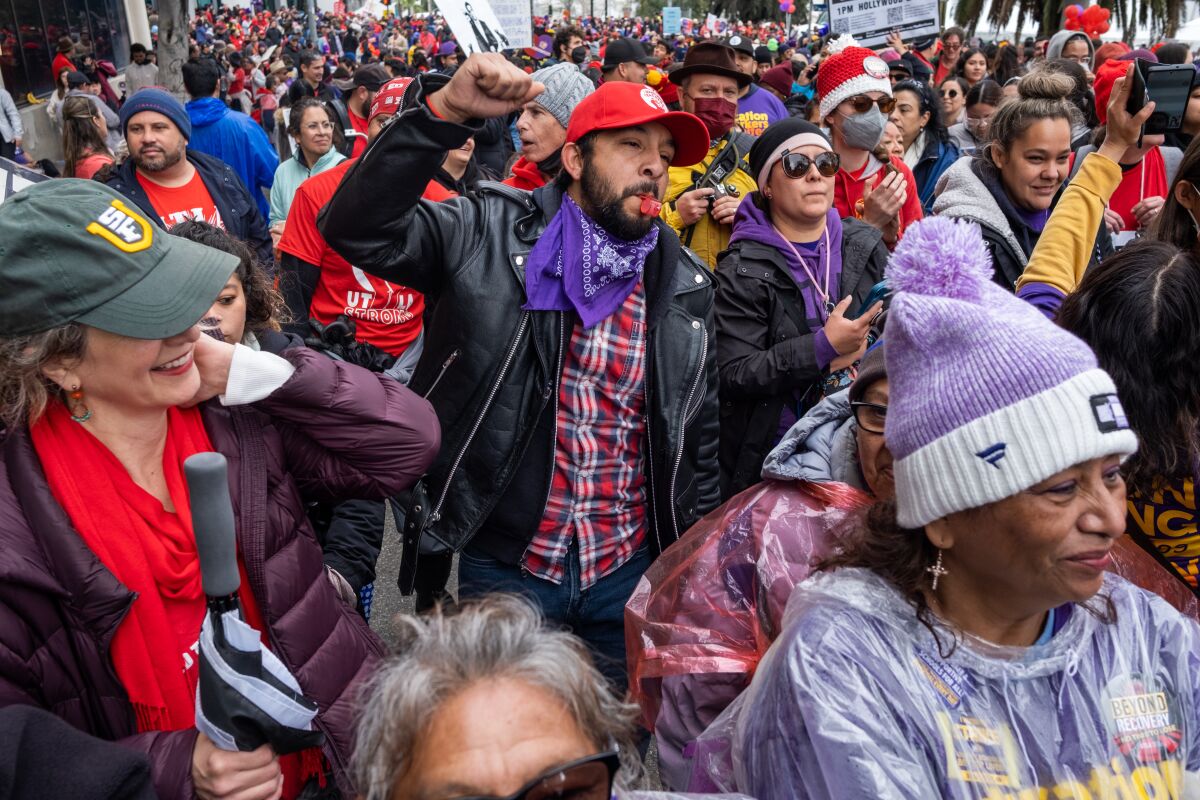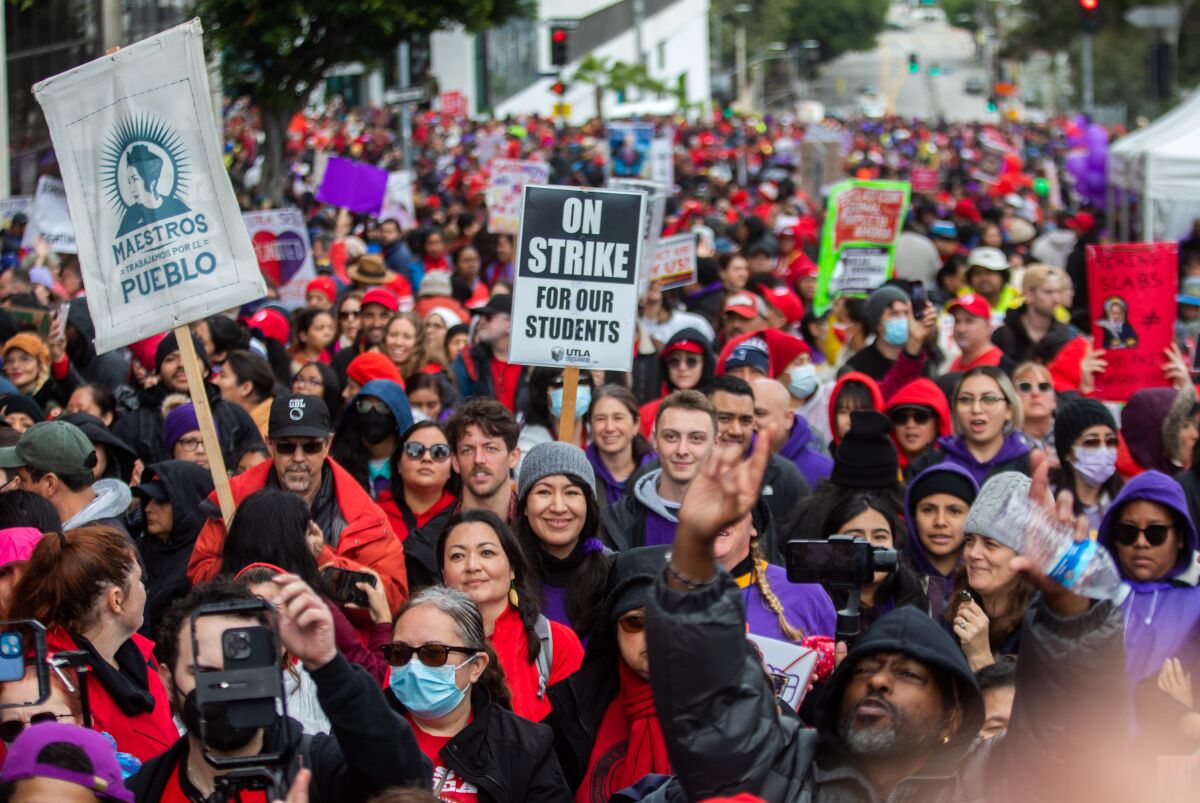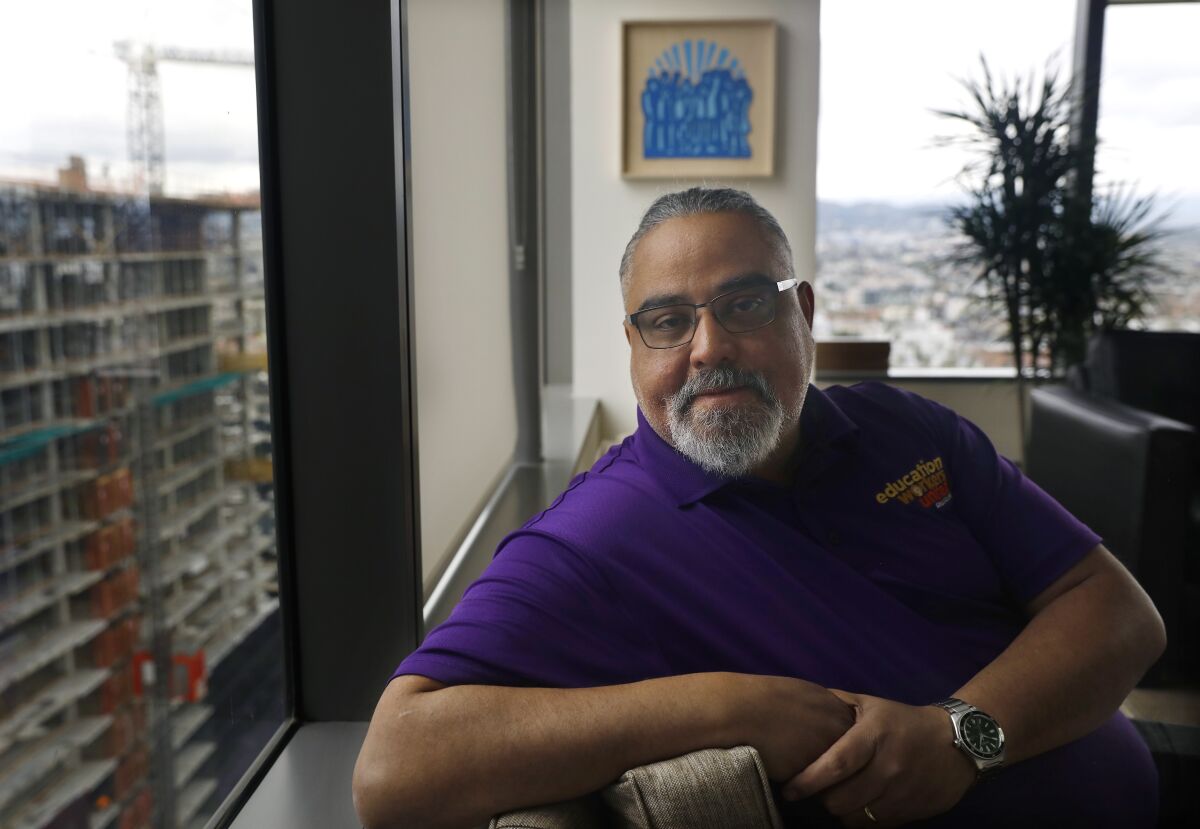As the Los Angeles Unified School District strike that has shut down campuses moves into its final day Thursday — with the possibility of future walkouts a reality — Mayor Karen Bass stepped into the dispute to mediate, but few details were available.
In a Wednesday update, posted on social media, Los Angeles school officials revealed few specifics, and the progress was not enough to prevent the third day of the walkout from going forward. But the talks remained crucial because the underlying issues in the strike have not been resolved and could lead to another walkout.
“District officials have been in conversation with SEIU Local 99 leaders with the assistance and support of Mayor Karen Bass,” the update said. “We continue to do everything possible to reach an agreement that honors the hard work of our employees, corrects historical inequities, maintains the financial stability of the District and brings students back to the classroom. We are hopeful these talks continue and look forward to updating our school community on a resolution.”

Protesters picket in front of the Los Angeles Unified School District headquarters on March 21, 2023, the first day of a three-day strike.
(Francine Orr / Los Angeles Times)
The walkout was spearheaded by Local 99 of Service Employees International Union — which represents the school system’s lowest-paid workers and whose members include bus drivers, teacher aides, special-education assistants, custodians and food-service workers. United Teachers Los Angeles urged its members to join in the strike — an action of solidarity that led to the closing of campuses.
Max Arias, the executive director of Local 99, expressed optimism Wednesday even as plans moved forward to continue the walkout into Thursday.
“We are grateful that the Mayor has stepped in to provide leadership in an effort to find a path out of our current impasse,” Arias said in a statement. “Education workers have always been eager to negotiate as long as we are treated with respect and bargained with fairly, and with the Mayor’s leadership we believe that is possible.”
The stakes are high for students and workers, said Pedro Noguera, dean of the USC Rossier School of Education.
“This is a lose-lose situation,” Noguera said. “The kids are losing out on their education. Sadly, the disruption is occurring just as many were getting used to being in school again” after campuses were closed during the COVID-19 pandemic. “The district is losing money each day schools remain closed, which means they’ll have even less to negotiate with. The workers are losing both because they are grossly underpaid and because their action may further weaken the district which they rely upon for their livelihoods.”
The negotiation process
The union has defined the walkout as a three-day protest of unfair labor practices, which typically involve allegations that an employer has interfered in legally protected, union-related activity.
Blanca Gallegos, the union spokesperson, said violations include illegal messaging from district officials, such as alleged threats of termination or retaliation against workers for voting to support a walkout or participating in one. The union also alleged that the district changed job classifications “for no reason” and gave “poor job performances” to bargaining team members because they were negotiating.
District officials have either denied wrongdoing or are still reviewing more than a dozen allegations filed with state labor regulators.
In a typical strike, workers begin their walkout when negotiations fail and end it when a deal is reached.
The formal negotiations between Local 99 and the district have been contentious but are following a step-by-step state-regulated process. The union has declared an “impasse,” which means talks are at a standstill between the two sides. After that, a mediator steps in — a process that has already occurred but also has failed to lead to an agreement.
The next step is fact-finding, in which experts will try to determine what the district can afford and assess the costs of the contract proposals from each side. That step has not begun.
Arias, in his statement Wednesday, used the words “current impasse” and therefore seemed to be referring to the formal negotiation process and not the ongoing job action.
But Gallegos later added more detail, suggesting that the dispute over contract issues and unfair practices was on the table to be resolved.
“Mayor Karen Bass is hosting the meeting in an effort to find a path past our impasse with LAUSD, including resolving issues of the contract and the unfair labor practices,” Gallegos said.
She cautioned against presuming there would be an immediate resolution.
“There is no timeline to how long these talks may take,” she said.
Gallegos did not rule out a return to the picket lines later “if the workers’ demands are not met.”

Los Angeles Unified school employees and supporters picket in front of district headquarters in downtown Los Angeles on March 21, 2023.
(Francine Orr / Los Angeles Times)
“Workers are ready and will not back down,” she said, “and so we’ll continue that process and [if] it would be to move forward with more action like this, then [we] will.”
The union wants a 30% across-the-board salary increase plus a $2-per-hour addition for the lowest-paid workers.
The district has offered a 23% pay increase and 3% bonus that L.A. schools Supt. Alberto Carvalho has called “historic.” Only workers on the job since the 2020-21 school year would receive the full wage increase.
Day Two of pickets
For rank-and-file union members, Day Two brought more picketing and rallies.
Bus drivers joined by other strikers and supporters began protesting in predawn hours at the district’s Gardena bus yard, yelling, “Don’t cross,” and carrying signs that read, “Equitable wages NOW!” and “Salarios justos AHORA!” Throngs of picketers converged under often rainy skies on campuses throughout the 700-square-mile school system and attended larger rallies later in the day.

Max Arias, head of SEIU Local 99, at the union’s offices in Los Angeles on March 20, 2023.
(Christina House / Los Angeles Times)
The walkout has been supported by United Teachers Los Angeles, which represents 35,000 teachers, counselors, therapists, nurses and librarians, many of whom stayed off the job in solidarity and joined picket lines. Striking workers forfeit their pay for time away from the job.
Armando Franco, an AP World History teacher who has taught at South Gate High School since 1994, described his Local 99 co-workers as “the most crucial working force at LAUSD.“
“Without them there are many things that wouldn’t happen,” Franco said, adding that it’s “shameful” to know his peers are suffering.
As cars passing South Gate High honked in support of picketers, Franco said he hopes the display of solidarity between teachers and support staff will help everybody, “especially the working class.”
“Ultimately, unions are the only mechanism that teachers have to ensure that a fair and equitable working condition is available,” Franco said.
While a three-day strike is not ideal, he said, the lost school days will be worth it if the union can bring about not just salary increases, but also wins including more full-time staff dedicated to cleaning schools, feeding students, providing after-school programming and supporting special-needs students.
“If you think about it, three days in the lifespan of a student is pretty insignificant, but those three days will have a significant impact in their lives if we get what we are asking for,” Franco said.
Carvalho has challenged the contention that the lost school days are unimportant or a necessary sacrifice. In a briefing this week, he said that every school day matters and that workers could achieve the best contract the district can afford without going on strike.
Times staff writer Grace Toohey contributed to this report.
Stay connected with us on social media platform for instant update click here to join our Twitter, & Facebook
We are now on Telegram. Click here to join our channel (@TechiUpdate) and stay updated with the latest Technology headlines.
For all the latest Education News Click Here
